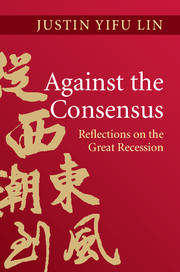Book contents
- Frontmatter
- Contents
- List of figures
- List of tables
- List of boxes
- Preface
- Overview
- Part I What Caused the 2008–9 Global Crisis?
- Part II A Win-Win Path to Recovery
- Part III How Poor Countries Can Catch Up: Flying Geese and Leading Dragons
- 8 The mystery of the great divergence
- 9 The mechanics and benefits of structural change
- 10 Lessons from the failures and successes of structural transformation
- 11 Unique opportunities for poor countries
- Part IV Toward a Brave New World Monetary System
- References
- Index
9 - The mechanics and benefits of structural change
from Part III - How Poor Countries Can Catch Up: Flying Geese and Leading Dragons
Published online by Cambridge University Press: 05 June 2013
- Frontmatter
- Contents
- List of figures
- List of tables
- List of boxes
- Preface
- Overview
- Part I What Caused the 2008–9 Global Crisis?
- Part II A Win-Win Path to Recovery
- Part III How Poor Countries Can Catch Up: Flying Geese and Leading Dragons
- 8 The mystery of the great divergence
- 9 The mechanics and benefits of structural change
- 10 Lessons from the failures and successes of structural transformation
- 11 Unique opportunities for poor countries
- Part IV Toward a Brave New World Monetary System
- References
- Index
Summary
The Roman emperor Marcus Aurelius famously observed that “the universe is transformation; our life is what our thoughts make it.” He thus outlined the essentially voluntary nature of success. Writing two millennia later, biologist Charles Darwin brought scientific reasoning to Aurelius’s observation and took it to another level by emphasizing the inevitability of transformation. In studying what he called “the struggle for existence,” Darwin conjectured:
More individuals are born than can possibly survive. A grain in the balance will determine which individual shall live and which shall die, . . . which variety or species shall increase in number, and which shall decrease, or finally become extinct. [. . .] The slightest advantage in one being, at any age or during any season, over those with which it comes into competition, or better adaptation in however slight degree to the surrounding physical conditions, will turn the balance.
Economists concerned with the development of poor countries have not pronounced such a stark diagnosis. Economics typically is not a zero-sum game, and even the most egregious policy failures rarely cause a country to disappear from the face of the earth. After all, few national economies perish simply because of natural selection. But the basic insight that underlies Aurelius’s and Darwin’s intuitions applies to economic development: long-term growth depends on continuing structural transformation.
- Type
- Chapter
- Information
- Against the ConsensusReflections on the Great Recession, pp. 106 - 122Publisher: Cambridge University PressPrint publication year: 2013



